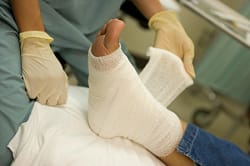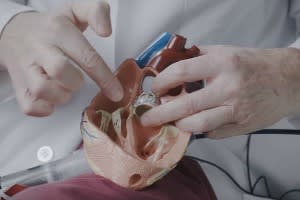Obstructive Sleep Apnea: What You Should Know
Published: November 19, 2019l
By Dominic Roca, MD, PhD
About 50-70 million of us nationwide have sleep disorders. If untreated, they can significantly impact aspects of our daily life. A common sleep disorder many face is obstructive sleep apnea.
Interested in a Sleep Study?
Effective treatment is available. Call 203.276.2300 to request an appointment.
What's Obstructive Sleep Apnea?
Obstructive sleep apnea (OSA) is a repetitive, partial blockage of the back of your throat by a combination of structures such as your tongue, roof your mouth or tonsils
People with OSA oftentimes sound like they're choking, gasping for air or snoring loudly. You likely aren't aware of these signs unless someone observes you sleeping and tells you.
Risk Factors for Obstructive Sleep Apnea
You or your child may:
- Be overweight
- Complain of headache or have trouble functioning in school
- Feel sleepy during the day
- Have high blood pressure
- Have irregular breathing while sleeping
- Snore loudly
If you answered yes to any of these questions, you or your child may be at greater risk for obstructive sleep apnea.
How do you Diagnose Obstructive Sleep Apnea?
To diagnose obstructive sleep apnea, you’ll need a sleep study. Your doctor can order the test from the Stamford Health Sleep Center. Sleep testing can be done at home or in the hospital, depending on your specific circumstances.
How do you Treat Obstructive Sleep Apnea?
There are multiple treatments for OSA. All require time, effort and a good support team to be effective. Treatments include:
- Oral Appliance—A custom device worn while sleeping that pushes your jaw forward and makes more room at the back of your throat
- PAP (Positive Airway Pressure)—A small pressurized mask worn while sleeping that helps maintain an open airway
- Positioning—Utilizing a device that prevents you from sleeping on your back
- Resistance Devices—Applied to nose, this treatment is meant for mild apnea. It partially blocks exhalation and this resistance helps to open the airway.
- Surgery—There are several surgical options that may improve OSA
- Weight Loss—A weight loss of 10% or more can improve OSA
What Happens if you Don't Treat Obstructive Sleep Apnea?
If you or your child is diagnosed with OSA, we recommend working with your doctor on a treatment plan. If untreated, OSA can impact adults and children in the following ways:
Adults
- High blood pressure
- Irregular heart rhythm
- Stroke
Children
- Hyperactivity
- Impaired growth
- Poor school performance
Obstructive Sleep Apnea Specialists
Count on our team of board-certified sleep and pulmonary physicians for swift and accurate diagnosis and treatment.
- All our staff is trained in sleep medicine and has personal experience with devices used to treat obstructive sleep apnea.
- Our staff is also trained to work with children to address the unique problems that affect infants and toddlers.
- The Sleep Center works closely with ear, nose and throat surgeons, psychologists, psychiatrists, dentists and your primary care doctor.
Together, we can help you address any sleep disorder including:
- Infant and toddler sleep problems
- Insomnia
- Narcolepsy
- REM behavior disorder
- Restless legs
- Sleep apnea
- Teenage sleep disorders such as phase delay
Featured Expert/ Author

Allergy and Immunology, Critical Care Medicine, Internal Medicine, Pulmonary Disease, Sleep Medicine
4.9 / 5 | 85 ratings































































